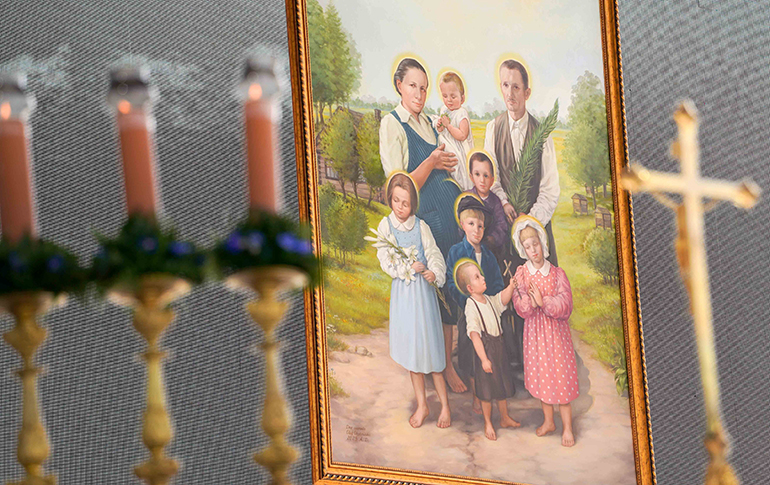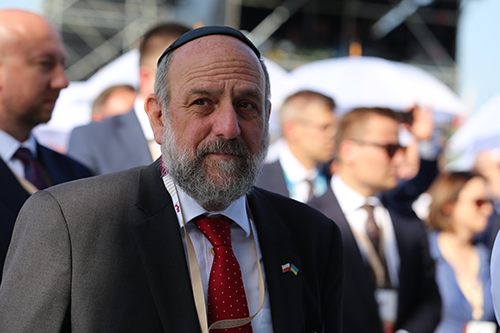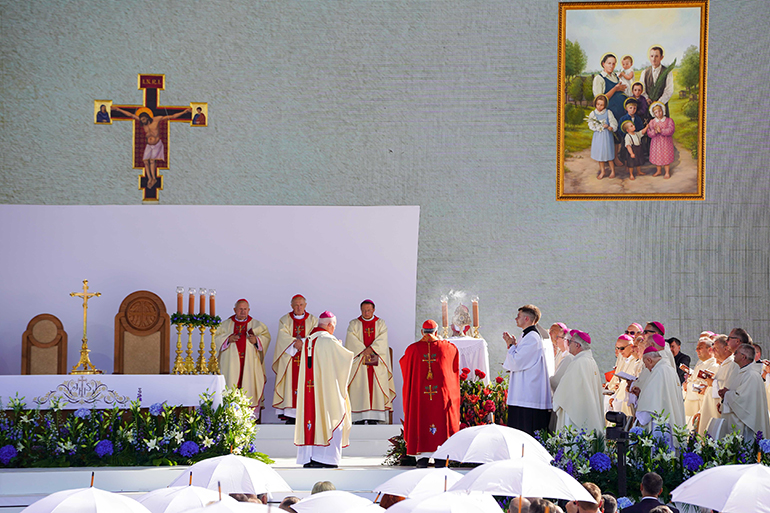By OSV News - OSVNews
OSV News | The Ulma family's beatification Sept. 10, 2023, in Markowa, Poland, was an unprecedented event in many respects. For the first time in Church history, a child born during the murder of the mother was beatified, along with the child’s six siblings and parents, Józef and Wiktoria Ulma. The story of the death of the Ulma family, along with the eight Jewish fugitives they sheltered, at the hands of the German occupiers of Poland, is truly compelling. But what is also extraordinary is the everyday life of the Ulma family — a story told in pictures taken by Józef himself. Learn the full story in this video via OSV News — the story of saintly lives lived and deaths heroically faced. It is the people of Markowa, the Ulma's relatives and neighbors, who tell the story of the family they remember now — a family that is now celebrated by the universal Church.
By Cindy Wooden
VATICAN CITY (CNS) | Risking and ultimately losing their lives to shelter Jews persecuted by the Nazis, "the martyrs Józef and Wiktoria Ulma and their seven children" were models of "evangelical love," Pope Francis said.
As the Mass for the beatification of the family was ending in Markowa, Poland, Sept. 10, 2023, the pope spoke about them to an estimated 20,000 people gathered in St. Peter's Square for the midday recitation of the Angelus prayer.
The entire family was "exterminated by the Nazis on March 24, 1944, for sheltering some Jews who were being persecuted," the pope said. The Ulma family's eight guests — Saul Goldman and his sons Baruch, Mechel, Joachim and Moses as well as Golda Grünfeld and her sister Lea Didner and young daughter Reshla — also were executed.
Cardinal Marcello Semeraro, prefect of the Dicastery for the Causes of Saints, also read the names of the Jewish family as he presided over the beatification Mass. Poland's Chief Rabbi Michael Schudrich attended the liturgy.
Pope Francis told those gathered at the Vatican that the Ulma family "countered the hatred and violence, which characterized that time, with evangelical love."
He prayed that "this Polish family, which represented a ray of light in the darkness of World War II, would be for all of us a model to imitate in striving for goodness and in the service of those in need."
"Let us applaud this family of blesseds," he said, leading the clapping.
"And following their example, let us feel called to counter the force of weapons with that of charity, the rhetoric of violence with the tenacity of prayer. Let us do this especially for so many countries suffering from war," the pope said. "In a special way, let us intensify our prayer for the tormented Ukraine."

Photographer: Justyna Galant
A portrait of Józef and Wiktoria Ulma, who is pregnant, and their six children hangs near the altar during their beatification Mass Sept. 10, 2023, in Markowa, Poland. Pope Francis prayed the family, killed for hiding Jews during World War II, would be an example to all Christians of goodness and service to those in need. (CNS photo/Justyna Galant)
While the feast days of Catholic martyrs usually is the day of their death, the feast day chosen for the Ulma family is July 7, Józef and Wiktoria's wedding anniversary. The Dicastery for Laity, the Family and Life noted the decision on X, formerly known as Twitter, saying the couple "lived their 'domestic church' with the sacrament of marriage at the center: openness to life of others in need and of their children."
Only six of the beatified children were mentioned by name at the Mass: Stanislawa, Barbara, Wladyslaw, Franciszek, Antoni and Maria. The Dicastery for the Causes of Saints said the seventh child was born during the massacre and that eyewitnesses reported that Wiktoria's body was found with the baby's head and part of its chest delivered.
Cardinal Semeraro said at the beatification Mass that "without ever having uttered a word, today the little blessed cries out to the modern world to welcome, love and protect life, especially that of the defenseless and marginalized, from the moment of conception until natural death."
Archbishop Adam Szal of Przemysl, whose southeastern diocese hosted the beatification, said, "For believers, this is a religious event, and we've prepared spiritually with prayers uniting every family in the faith. But we also want it to ensure the historical truth is known, and a more truthful image of Poland presented to the world."

Photographer: None
Chief Rabbi of Poland Michael Schudrich participated in the outdoor beatification Mass of the Ulma family, celebrated at the soccer stadium in Markowa, Poland, Sept. 10, 2023. He said the Ulmas are “mentors.” Józef and Wiktoria Ulma and their seven children died, murdered by Nazis, when denounced after helping a Jewish family on March 24, 1944.(OSV News photo/Polish Bishops Conference)
In an OSV News interview, he said the heroic story offered "lessons and challenges" to contemporary society, adding that he was grateful for the involvement of Jewish groups in the beatification, led by Poland's U.S.-born chief rabbi, Michael Schudrich.
"It will evoke the terror of a war in which human dignity was scorned and lives destroyed in the name of a murderous ideology," Archbishop Szal told OSV News.
"From the attitude of those who protected others, however, we can also find a summons to our contemporary world, where refugees still face persecution and need us to show empathy within our possibilities," he said.
Over 32,000 people registered to attend the beatification, which was conducted at Markowa by Cardinal Semeraro, assisted by 1,000 priests and 80 cardinals and bishops, with a 1,250-member choir and orchestra.
The Mass, close to a new Museum of Poles Saving Jews in World War II, was preceded by a prayer novena in the Przemysl Archdiocese's 399 Catholic parishes, and also was attended by Poland's president, Andrzej Duda, and officials from two dozen countries, including the United States.
However, in a Sept. 5 statement, Cardinal Semeraro denied media claims that an "unborn child" also would be beatified during the ceremony.
He said Wiktoria Ulma's seventh unnamed child had, in reality, been "born at the moment of the mother's martyrdom," receiving the "baptism of blood," and could therefore be "added to the group of child martyrs." Medicine terms this a so-called coffin birth, coming after the death of the mother.
Speaking at the Sept. 3 unveiling of a memorial in Markowa, a descendant of the eight fugitive Jews shot with the Ulma family, Ellen Goldman, said she had learned of her cousins' fate only "many years later" while living in New York, and been "moved to tears" when also reading about the "supreme sacrifice" of the Ulmas.
She added that it was heartening to know entire families had "done the right thing" even "in the midst of such a nightmare," while rejecting Nazi propaganda and "truly living out the teachings of Christianity and Judaism."

Photographer: Justyna Galant
Cardinal Marcello Semeraro, prefect of the Dicastery for the Causes of Saints, uses incense to bless the relics of Józef and Wiktoria Ulma and their seven children, during their beatification Mass Sept. 10, 2023, in Markowa, Poland. Pope Francis prayed the family, killed for hiding Jews during World War II, would be an example to all Christians of goodness and service to those in need. (CNS photo/Justyna Galant)
Meanwhile, the director of Warsaw's Pilecki Institute, which organized the unveiling ceremony, welcomed the presence of family members of both rescued Jews and Poles murdered for helping them, and told OSV News the beatification would display "an important fragment not only of the life of the Ulma family, but also of Poland itself."
"Any rescue attempt, especially when it ended with the death of those responsible, is a testimony to humanity and solidarity with the persecuted, as well as to courage and mercy," said Magdalena Gawin, whose institute is named after Witold Pilecki (1901-1948), who helped organize the resistance and reported on German atrocities at the Auschwitz concentration camp, but was shot as a "foreign imperialist" agent by Poland's post-war communist regime.
"The Ulma family's beatification is important for Catholics but also for all of humanity, in breaking the unfair and harmful stereotype that hiding someone without a happy ending signifies a failed rescue attempt. In reality, people murdered for helping the persecuted have a special place with God," Gawin said.
The beatification ceremony included the presentation of a specially designed reliquary by Markowa's parish priest, Father Roman Chowaniec, and the reburial of the Ulmas' remains in the town's 17th-century St. Dorothy Church. The reliquary will be placed in the side altar of Virgin Mary.
"It is made in the form of a sarcophagus," Father Chowaniec told OSV News. "It is crowned with a palm branch, which in Christian iconography is a symbol of martyrdom," he said.
A separate ceremony was conducted Sept. 10 by Cardinal Semeraro, Archbishop Szal and Rabbi Schudrich at the nearby Jagiella-Niechcialki war cemetery, where the eight murdered Jews lie buried.
In a Sept. 5 commentary for Poland's Catholic Information Agency, known as KAI, the Markowa museum's director, Waldemar Rataj, said the sheltering of Jews had been known among the town's 4,500 inhabitants, testifying to the Christian "values, principles and social norms that had shaped the community for centuries."
The German police commander, Eilert Dieken, had justified killing the Ulma children to spare Markowa residents "the trouble of looking after them," and died at age 62, after working as a policeman in his hometown of Esens without any penalty for his war crimes.
In her OSV News interview, Gawin said she hoped "death for helping during the occupation" would be recognized as a crime against humanity.
However, she added that historians and researchers had not identified a single German ever judicially punished for "murdering Poles for helping Jews," and said she hoped the "problem of unpunished crimes" would now be approached in a new way.
Meanwhile, Archbishop Szal said he was grateful to Jews who had helped "cultivate the memory" of the Ulma family, especially Abraham Segal, one of Markowa's 21 Jewish survivors, whose work had been continued by his children and grandchildren since his death in Israel in 2019.
"Like others, he felt called to tell the truth — as someone whose life was saved and who was protected by others on many occasions," the Przemysl archbishop told OSV News.
"People of goodwill, even those far from these events today, can draw many lessons from them — particularly through the example of a family deeply involved in the social and religious life of their community, which was able to maintain its sacramental dignity and stay loyal to moral values even in such harsh conditions," he said. "In the Ulma family photos, we see happy children who, though barefoot and poorly dressed, clearly feel safe and secure thanks to the love of their hard-pressed parents."
Jonathan Luxmoore, who writes for OSV News from Oxford, England, contributed to this report.

